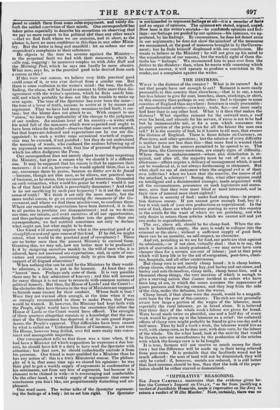THE DISTRESS.
WHAT is the distress of the country? What is its nature? Is it not that people have not enough to cat? Raiment is more easily procurable in this country than elsewhere,—that is to say, a man has less labour to give for coat, breeches, shoes, stockings, or shirt, in this country than perhaps in any other : fuel is cheaper in some counties of England than anywhere: furniture is easily procurable : all manufactured articles—crockery, tools, &c.—are more easily had here than in any other land. What is it then that makes the distress? What signifies raiment for the outward man, a roof over his bead, and utensils for his service, if FOOD iS not to be had but by immeasurable toil, or for a sum which consumes the greater portion of the price given for all the labour the man can sell? It is the scarcity of food, be it known to all men, that causes the distress of England. There is fierce debate on Currency, on Poor-laws, and other questions ; but the solution of every difficulty is neither more nor less than this—that more food is wanted than can be had from the sources permitted to be opened to us. The Poor-laws, the Currency-nostrums, are simply signs of difficulty. Where there is embarrassment—where nice distribution is re- quired, and after all, the majority must be cut off on a short allowance—affairs require a delicacy of management which, it need not be wondered at, is not always forthcoming in statesmen. But what shall we say of statesmen when the original evil is of their own infliction ? when we know that the scarcity, the source of all the mischief, is arbitrary? Seeing this, what other opinion could an intelligent and a disinterested stranger, made acquainted with all the circumstances, pronounce on such legislators and states- men, save that they were most blind or most interested, and in their view of interest most short-sighted ?
Distress is scarcity of food : make food cheap then—in propor- tion distress ceases. If you cannot grow enough food, buy it ; buy it with such of your own productions as superabound. In the case of food, there are whole nations panting to serve this country in the article for the want of which we are perishing, and who only desire in return those articles which we cannot sell and yet can make in superabundance.
The cry, above all, should be for cheap food. When the sto- mach is habitually empty, the man is ready to collapse into the criminal or the slave : without a sufficient supply of good food, there can be no morality, no self-respect, no character.
And yet, perishing as we are for food, our ports are shut against its admission,—or if not shut, virtually shut : that is to say, the pitch of starvation is nicely graduated,—we may never have corn cheaper than for a certain amount of labour; just at that price which will keep life in by the aid of emigration, poor-laws, chari- ties, hospitals, and all other contrivances.
But cheap corn is not merely cheap bread : it is cheap butter, cheap cheese, cheap malt, cheap hay, and barley and oat-straw, and barley and oats themselves, cheap milk, cheap horse-hire, and a thousand cheap things, the very mention of which is enough to give a starving nation that disease incident to sailors who have been long at sea, in which the ocean assumes the appearance of green pastures and flowing streams, and they leap from the side of the ship, under the delusion, into the waves.
Cheap bread, if that alone were the result, would be a magnifi- cent boon for the poor of this country. The rich are not generally aware how large a portion of the wages of the labourer, more especially the rural labourer, go in bread alone. It is believed that three dais of the whole week's labour are given for bread. Were bread made twice as plentiful, one and a half day of every week would be given up to the labourer as a relief: the collateral effects of cheap corn might probably be found to give one (lay and a half more. Thus by half a week's work, the labourer would live as
well, with cheap corn, as he does now, with dear corn, by the labour of the whole. On the other band, look at the activity that would be thrown into our manufactures by the production of the articles with which the foreign corn is to be bought.
It is true, farmers will not receive so much money for their corn ; but the difference will be made up in their being relieved from poor-rates. It is probable that the landlords would not be much affected : the uses of land will not be diminished, they will only be varied : if, however, rentals are reduced, it is still better that land-incomes should be less, than that the bulk of the popu- lation should be either starved or demoralized.
















 Previous page
Previous page